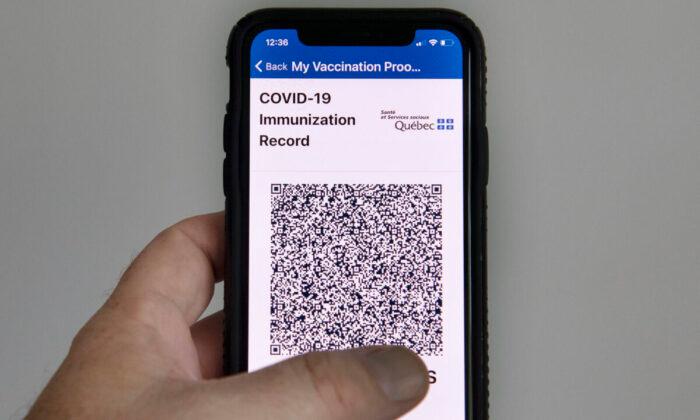Health Canada is seeking a contractor to further develop its COVID-19 vaccine passport system and extend it to include other health data such as exemption and recovery credentials, according to a tender notice.
“In response to the COVID-19 outbreak, there has been a global effort to advance vaccines and therapeutics and develop public health digital solutions,” says the statement of work introducing the project issued by Public Services and Procurement Canada (PSPC).
“Canada’s ability to defeat COVID-19 depends greatly on assembling immunization data to guide key decision making throughout the pandemic.”
The incumbent for a previous contract of a similar nature is Deloitte Inc., which was awarded a contract for $59 million spanning January 2021 to January 2023. Bidding details made available by PSPC indicate the previous contract was for the development of the National Vaccine Management Information Platform (NVMIP), with the Canadian COVID-19 proof of vaccination credentials being delivered as part of it.
The statement of work for the new initiative states that the Digital Transformation Branch (DTB) within Health Canada will “provide thought leadership in standards and solutions for Canadian health credentials for specific pan-Canadian initiatives.”
Those include “proof of vaccination credentials (PVC), exemption credentials, test credentials, recovery credentials, conversion from one standard to another, support solutions to address immunization international interoperability, enhance connections to internal Health Canada systems, etc.”
The Epoch Times contacted Health Canada to ask how many of these have been issued to date but no response was received by publication time.
Health Canada wants the new solutions developed to be geared for domestic uses and international travel.
Digital ID
The new contract also suggests the federal government intends to merge vaccine passports with a digital ID system.The statement of work defines a digital health credential as an electronic document that details a “medical qualification, competence, health status, record” issued by a relevant authority.
“The credentials could include a verifiable digital identity of the issuer and the holder of the credential,” says the document.
The selected contractor’s role will be to develop new releases of the PVC and related technologies, and provide expertise on the design, implementation, and use of health credential technologies.
‘Health Emergency’
Health Canada is pursuing this product at a time that all provinces and territories have long dropped vaccine passport systems and COVID-19 restrictions, save for a few measures related to health workers in some provinces. The federal government has also lifted vaccine mandates and opened the border, though it reimposed restrictions on travellers from China in early January.The government has indicated that it “acknowledges” that the World Health Organization (WHO) still considers COVID-19 a “public health emergency of international concern.”
Data Tracing
Canada’s continued focus on COVID-19 takes many shapes in the information space and relies heavily on new technologies.The tracking of movement was used in part to assess compliance with lockdown orders.
The government also subscribes to the vision of the World Economic Forum (WEF) to usher in a “Fourth Industrial Revolution.”
The WEF is a globalist organization of leaders in the fields of politics, industry, and activism that seeks to influence government and corporate governance.
Innovation Canada spearheads a project under that framework to test the use of digital credentials to obtain services, complete transactions, and cross borders, according to internal details revealed by the Treasury Board.
Transport Canada was also involved in another digital ID WEF initiative, the Known Traveller Digital Identity (KTDI).
The department says the project is now over and being closed out, with new initiatives to be unveiled next spring.
The Dutch government, which was the other state entity involved in the KTDI initiative, told The Epoch Times it will conduct another digital ID project with Canada in the coming months.
Digital Concerns
Critics of widespread digitization fear it will usher in a social credit system like that seen under the dictatorship of the Chinese Communist Party, where everything is tracked and citizens can be denied services based on their opinions.“In a worst-case scenario, it can be used, as it is in communist China, to control citizens’ movement and access to basic social services. It could even be used to control what you can buy or where you can go if used in conjunction with a vaccine passport or lockdown rules like we’ve seen in the past.”





